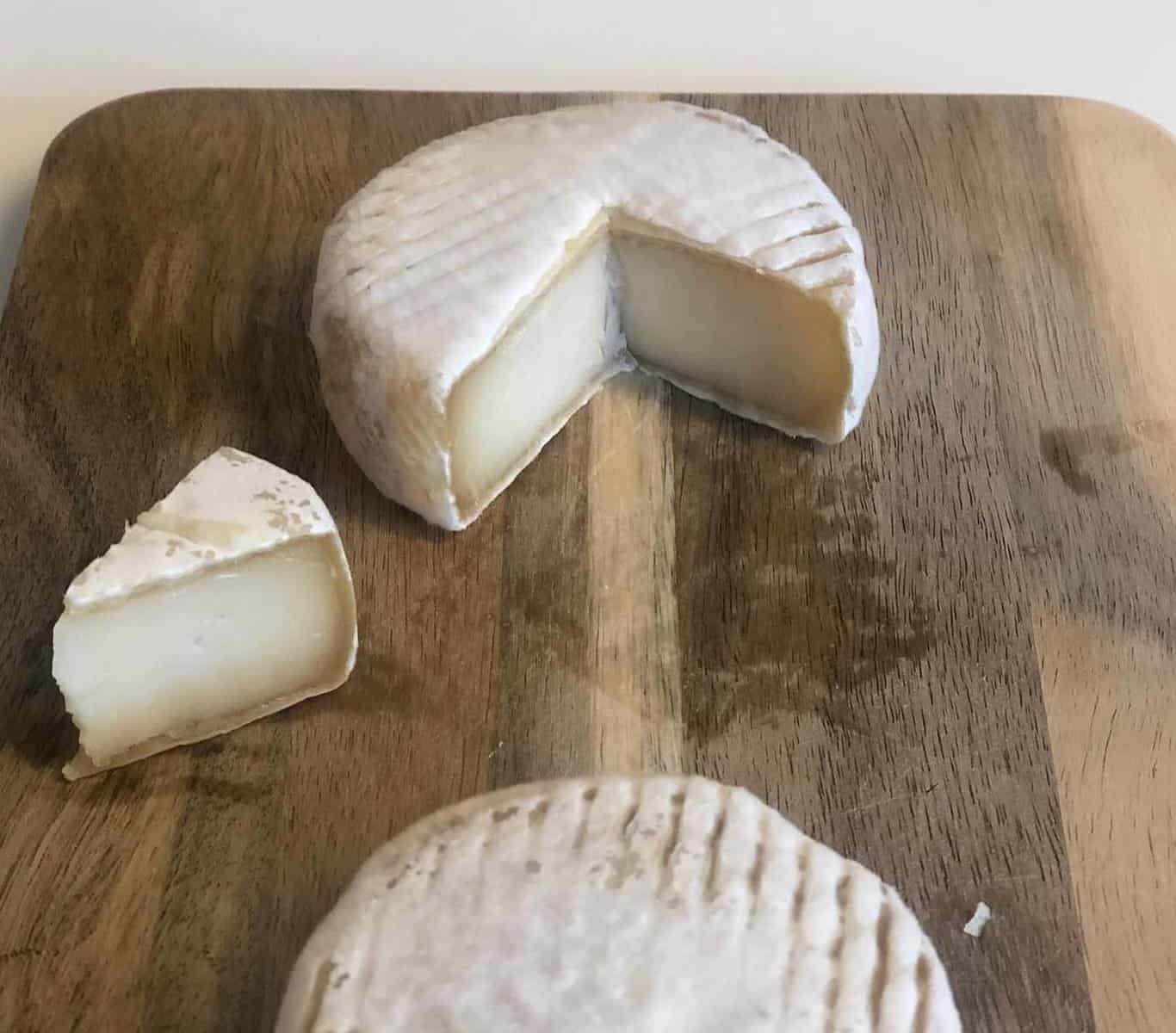FÆRM is a Danish B2B food tech startup using food science, traditional fermentation techniques, and legumes to craft plant-based cheese “just like dairy cheese.”
Andrea Donau (CEO) and Mikkel Dupont (COO), started out in a kitchen, moving to a rented basement-turned-lab in 2020 to achieve a difficult feat: making soy milk coagulate like cow’s milk.
Today, FÆRM licenses food manufacturers a patented method that mimics dairy fermentation to produce high-quality plant-based cheese without coconut oil, starches, or additives. The startup recently received €1.3 million in funding from BioInnovation Institute’s Venture House program to further commercialize its technology.
We spoke with Andrea and Mikkel about this game-changing cheesemaking method for plant proteins that promises to democratise plant-based cheese.

Can you tell us the inspiration behind founding FÆRM and how the company started?
Founding FÆRM had three main drivers for us: providing a good alternative for plant cheese, Andrea’s scientific curiosity, and Mikkel’s desire to create a great workplace.
We met in April 2018 while we both had student jobs in the telemarketing department of a Danish newspaper. At this workplace, we slowly became friends over beer and discovered that we had very different backgrounds: food science and business law.
We both desired to do something different with our lives than the path our educations would normally dictate. That, coupled with Mikkel’s lactose intolerance and Andrea’s experiments with plant cheese, led us to found FÆRM on New Year’s Night 2019/2020.
Initially, we experimented with sunflower seeds and nuts but couldn’t achieve the results we wanted on that base. We decided to explore another option that was less allergen-laden, worked at a lower price point, and could work with the existing dairy industry instead: beans.
“The enzymes we use are essentially the plant-based answer to rennet”
Our hypothesis was that if you can make cheese from cow’s milk with enzymes and bacteria, it must also be possible to do it with plant proteins. So, we decided to change our strategy to working with beans, cultures, and enzymes. We didn’t know if it was possible to do what we wanted to, to split bean drink into (plant) cheese curds and whey, so we hired based on optimism and mindset.

And it took a long time — eighty experiments each day for months. We were trying different enzymes with different plant proteins under what felt like twenty different conditions to achieve coagulation.
Finally, one day, we got beautiful clear whey and firm curds, and we knew we had the building blocks to mature into so many different kinds of plant cheese. High in protein, able to run in existing dairy plants, and at an accessible price for consumers, we had the democratization of plant cheese. It was important for us to achieve enzymatic coagulation in bean milk in order to follow traditional cheese-making methods as closely as possible.
The goal was to achieve a curd that could be matured using different types of cultures to unlock the option of turning white, fresh curds into a wide variety of different plant cheeses. The curds must be strong enough to get pressed/drained for whey while retaining their flexibility and hold up well for several months during maturation, just as their dairy counterparts. The only way we could see ourselves getting there was with enzymes. The enzymes we use are essentially the plant-based answer to rennet, and the flavor, of course, comes from færmentation.

You say “It’s time we treat plant-based cheese like cheese.” Please tell us what you mean and how you treat your cheese like traditional dairy.
For some time, plant-based cheese products have focused on mimicking dairy cheese in looks, but many important functions of those products have been lacking, for example, taste and how they react to heat. The reason is that most plant-based cheeses today consist of coconut oil, starch, and taste intensifiers blended and molded to look like cheese.
Our technology enables companies to make plant-based cheese exactly like the dairies do today. That means taking a liquid protein source, making the proteins coagulate, pressing out excess whey, and then færmenting the curds to create the cheese taste and make the curds firmer. In our fermentation, we use bacteria that help to produce more dairy-like flavors and reduce bean-related aromas.
So, when we say “It’s time to treat plant-based cheese like cheese,” we mean that it’s time to put plant-based protein sources through the same processes as dairy cheese to create cheese-like plant-based products.
You craft “plant-based cheese that matches dairy cheese in taste, texture, and quality” using a patented technology. Can you explain how it works?
We had a breakthrough when we started using enzymes, as with traditional cheese-making methods, and subjected plant milk to a similar treatment to see if we could arrive at a coagulated mass: cheese curds. This is the technology we’ve patented.

Please walk us through partnering with you to make plant-based cheese. Do you work only with Danish clients?
We work with clients worldwide, basically anyone interested in introducing a plant-based alternative to cheese in retail, restaurants, canteens, or elsewhere. Our partnerships are not exclusive to dairies either. We also work with plant-based food producers.
The process of working with us starts with deciding on the success criteria of the final product. This is something we do with our client, to make sure it’s something we can do and something they would be proud to send to the market with their own brand on it.
During the development phase, we speak to our client about commercial terms and go-to-market strategy for their new product, and spar with them on how to make the processes work in their existing facilities. If they do not have existing facilities, then that is something we can use our network for as well.
We understand you offer services from product development to manufacturing. Do you have a dedicated team to manage your clients’ requests?
We do, yes. Most of our team is dedicated to R&D and managing partnerships, all of them specialized in biotech, microbiology, enzymes, proteins, or dairy engineering. They are experts in what they do and are some of the most creative people we have ever met.

Do you have a product portfolio?
We have a product portfolio of our ‘tried and trues’, but we encourage our partners to share with us what they think would work best for their target market. As we’ve learned from talking to customers, what constitutes a brie in Germany does not constitute a brie in France, and vice versa.
Our customers know their segment best, and since our technology can be easily customized, we want to ensure that we hit the right marks to make the product successful for a specific demographic. It’s a bit of a tailoring work.
Can you share any upcoming product launches or innovations that FÆRM is excited about?
We definitely can! FÆRM is actually entering the food service market of Denmark this autumn. It’s been a very long road to finally pull the trigger to produce some products on our own and not in a partnership.
“In Europe alone, the sales of plant-based cheese grew by 62% between 2020 and 2022 while sales of their dairy counterpart fell by 4%”
We finally decided to move ahead because of the increased interest from partners who do not have their own production set-up, and a potential partnership would depend on us having the facilities. And then we figured, if we’re already setting up production, why not have some fun with it and make sure the restaurants and canteens of Copenhagen can get their fingers on it, too?
The first product we will be launching through foodservice is the very first product we developed: the versatile cream cheese analog. It’s good for baking, cooking, and whipping and has the same specs as a dairy-based Philadelphia cream cheese.

What are FÆRM’s long-term goals, and where do you see the company in the next decade?
In the future, FÆRM’s products will be manufactured worldwide as a white-label solution with our partners. We see a wide portfolio of high-quality plant-based cheeses available to consumers, making dairy-free cheese products a real alternative that functions well in food and tastes great.
“FÆRM is actually entering the food service market of Denmark this autumn. It’s been a very long road “
For the same reason, the narrative surrounding plant-based cheese has improved, and more consumers are open to trying out plant-based alternatives to their conventional dairy products. Just like oat drinks today, we want high-quality plant-based cheese to become common and available everywhere.
How do you see the plant-based cheese market evolving in the next 5-10 years, and what role do you envision FÆRM playing in this landscape?
The market for plant based products is gaining popularity in both Europe and in the US and this is a trend that seems to be continuing with an expected growth of approximately 13 % CAGR by 2030. In Europe alone, the sales of plant-based cheese grew by 62% between 2020 and 2022 while sales of their dairy counterpart fell by 4%. Furthermore, research shows that the most important things for consumers are taste, texture, nutritional value and availability.
We want our technology to benefit as many people as possible and at a price that is affordable. Whether it’s a retail customer, someone who wants to put it on a mass-produced frozen pizza, or someone who wants to use it in their Michelin starred restaurant isn’t important. As long as more people get more and better plant-based cheese alternatives to choose from.
"oat" - Google News
June 20, 2024 at 11:05AM
https://ift.tt/J9yEUlm
FÆRM: "Like Oat Drinks Today, We Want High-Quality Plant-Based Cheese to Become Available Everywhere" - vegconomist - the vegan business magazine
"oat" - Google News
https://ift.tt/J2cDU53
https://ift.tt/8FJzKfZ
Bagikan Berita Ini














0 Response to "FÆRM: "Like Oat Drinks Today, We Want High-Quality Plant-Based Cheese to Become Available Everywhere" - vegconomist - the vegan business magazine"
Post a Comment